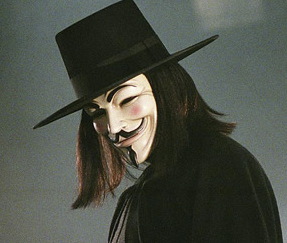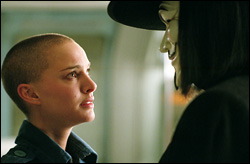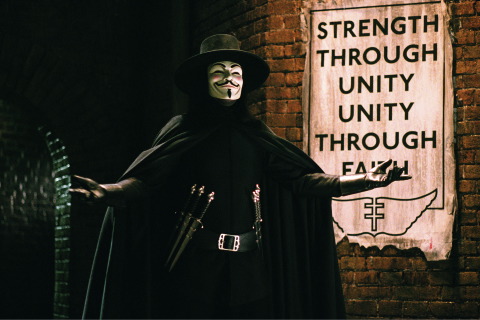V for Vendetta

the fifth of November,
gunpowder treason and plot.
I see no reason
why the gunpowder treason
should ever be forgot
Okay, writing a movie review is really cheating on my blog hiatus, so I'll try to make this quick.
Kathy and I went to see V for Vendetta last night, the latest offering from Andy and Larry Wachowski, the creators of the Matrix trilogy. Regardless of how it will be received at the box office, I believe this movie to be a significant motion picture which is why I'm violating the break from my blog to comment on it.
The story itself has been adapted from a graphic novel by Alan Moore, although you won't see his name in the credits. Moore has totally disassociated himself from this picture. Supposedly he has been unhappy with previous movie treatments of his works including From Hell and The League of Extraordinary Gentlemen. I've also heard that he did not approve of the script for this movie. There are some very disturbing things about this film which I'll detail below, but Moore is no stranger to the disturbing; so I don't know if this had any impact on his distance from the project or not.
The movie itself takes place in some kind of alternative timeline in which the United States, locked into a civil war, is no longer a world power; and Britain has become a fascist state under a totalitarian dictator (played by John Hurt) with shades of Adolf Hitler. Irrelevant note: I observed that some of the characters in Britain (where the movie entirely takes place) were using current-day Dell computers. I wonder if Dell relocated to Britain before the US Civil War?

Hugo Weaving had the incredible challenge to act throughout the entire movie using only his voice and body language because his face was completely hidden behind the mask. You don't even see moving lips or eyes. Perhaps only Weaving could do this. Perhaps this kept us from seeing V as Mr. Smith or Elrond. Regardless, I imagine that only a Shakespearean-trained actor could have pulled such a role off. Weaving does it well. And V tends to talk fast and eloquently, so the viewer has to pay close attention. It might be worth seeing this movie again just to listen to Weaving deliver some of his lines. Consider V's introduction of himself to Evey:
This visage, no mere veneer of vanity, is it vestige of the vox populi, now vacant, vanished, as the once vital voice of the verisimilitude now venerates what they once vilified. However, this valorous visitation of a by-gone vexation, stands vivified, and has vowed to vanquish these venal and virulent vermin vanguarding vice and vouchsafing the violently vicious and voracious violation of volition. The only verdict is vengeance; a vendetta, held as a votive, not in vain, for the value and veracity of such shall one day vindicate the vigilant and the virtuous. Verily, this vichyssoise of verbiage veers most verbose vis-à-vis an introduction, and so it is my very good honor to meet you and you may call me V.
What the Matrix was to philosophy, V for Vendetta is to British literature and history. Although there is certainly a good amount of philosophy, too--especially political philosophy. Consider V's line, "People should not be afraid of their governments; governments should be afraid of their people." And when V began to speak of causality, I thought I was having a flashback to the Merovingian in Matrix Reloaded. The movie borrows themes from a number of stories from the past including Phantom of the Opera, Orwell's 1984, and even Bradbury's Fahrenheit 451.
A person could certainly see this movie as yet another a tale of revenge, or perhaps even a "beauty and the beast"-type love story, but I believe there is a much darker message below the surface of this film.

Now, in no way do I believe that we live in that kind of world, but that doesn't mean that there aren't certain individuals in our society who interpret the Bush administration's response to 9/11, especially in regard to the Patriot Act, as a significant limitation of our personal freedoms. Allusions to the ideological clash between traditionalists in our country and those who would advocate "lifestyle choice" surely can't be missed in this movie, let alone references to pedophile priests in light of the tragic events of the recent past. In V's world, even the Koran is illegal, and having a copy is grounds for the death penalty.
My fear is that a movie like V for Vendetta could move an unstable mind on either the extreme far left OR the extreme far right to resort to violent means against the government or even the church to send a message. Think I'm paranoid? Consider V's statement justifying the blowing up of the Parliament building: "The building is a symbol, as is the act of destroying it. Symbols are given power by people. Alone a symbol is meaningless, but with enough people involved as well, blowing up a building can change the world." Such a suggestion in a movie after 9/11 seem unimaginable, yet here it is.
V for Vendetta is undeniably meant to draw allusions to current political situations in our country. The fact that it is set in Britain is entirely a smokescreen. This movie is written to be provocative. The difference is that we do not live in a totalitarian state. If the majority of our citizens don't like public policy, we have the freedom to vote our leaders out of office. That was not really an option in V's alternate reality. Nor are a handful of abusive clergy the norm considering we have tens of thousands of priests and pastors who would never dream of harming a child.
My hope is that V for Vendetta will be seen as a movie and only that. I don't deny that it is very entertaining at times, and there are terrific performances by Weaving and Portman. However, I shudder to think what could happen from the hands of those who have trouble distinguishing between fantasy and reality.









